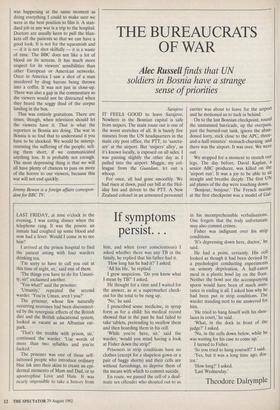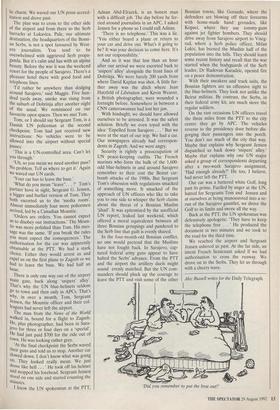THE BUREAUCRATS OF WAR
Alec Russell finds that UN
soldiers in Bosnia have a strange sense of priorities
Sarajevo IT FEELS GOOD to leave Sarajevo. Nowhere in the Bosnian capital is safe from snipers. The main route out is one of the worst stretches of all. It is barely five minutes from the UN headquarters in the main city post office, the PTT, to 'sanctu- ary' at the airport. But 'snipers' alley', as it's known locally, is exposed on all sides. I was panting slightly the other day as I pulled into the airport. Maggie, my col- league from the Guardian, let out a whoop.
For once, all had gone smoothly. We had risen at dawn, paid our bill at the Hol- iday Inn and driven to the FYI'. A New Zealand colonel in an armoured personnel carrier was about to leave for the airport and he motioned us to tuck in behind.
On to the last Bosnian checkpoint, round the unmanned barricade, up the overpass, past the burned-out tank, ignore the aban- doned lorry, stick close to the APC, three- and-a-half-minutes' stomach-churning and there was the airport. It was over. We were out.
We stopped for a moment to stretch our legs. The day before, David Kaplan, a senior ABC producer, was killed on the `airport run'. It was a joy to be able to sit straight and breathe deeply. The first UN aid planes of the day were touching down.
'Bonjour, bonjour.' The French marine at the first checkpoint was a model of Gal- lic charm. We waved our UN press accred- itation and drove past.
The plan was to cross to the other side of the airport and from there to the Serb barracks at Lukavica. Pale, our ultimate destination, the headquarters of the Bosni- an Serbs, is not a spot favoured by West- ern journalists. You tend to be overwhelmed with aggrieved Serb propa7 ganda. But it's calm and has with an alpine beauty. Before the war it was the weekend resort for the people of Sarajevo. There's a pleasant hotel there with good food and telephone lines.
`I'd rather be anywhere than dodging around Sarajevo,' said Maggie. Five hun- dred yards away, smoke was rising from the suburb of Dobrinja after another night of the usual. We reminisced on our favourite open spaces. Then we met Tom. Tom, or I should say Sergeant Tom, is a Danish UN policeman at the second checkpoint. Tom had just received new instructions: No vehicles were to be allowed into the airport without special passes.
`This is a UN-controlled area. Can't let you through.' `Uh, so you mean we need another pass? No problem. Tell us where to get it.' Again we waved our UN cards.
`Your car has to leave the base.'
`What do you mean "leave". . . ?' Tom's Partner hove in sight, Sergeant G. Jensen, a bigger and burlier version of Tom. They both escorted us to the 'media room'. Almost immediately four more policemen arrived, led by a Canadian Mountie. `Orders are orders. You cannot expect us to disobey our instructions.' The Moun- tie was more polished than Tom. His mes- sage was the same. 'If you break the rules You must expect the consequences.' The authorisation for the car was apparently obtainable at the PTT. We had a stark Choice. Either they would arrest us and expel us on the first plane to Zagreb or we had to leave the base. We had half an hour.
There is only one way out of the airport main gate, back along 'snipers' alley'. That's why the UN blue-helmets seldom go to town and then only in APCs. That's Why, in over a month, Tom, Sergeant Jensen, the Mountie officer and their col- leagues had never left the airport.
The man from the News of the World walked in, bound for a flight to Zagreb. He, plus photographer, had been in Sara- jevo for three or four days on a 'special'. He had just paid $700 for the ride out of town. He was looking rather grey.
At the final checkpoint the Serbs waved their guns and told us to stop. Another car slowed down. I don't know what was going on. They looked really mean. We just drove like hell . . . ' He took off his helmet and mopped his forehead. Sergeant Jensen stood on one side and started counting the Minutes.
I know the UN spokesman at the PTT, Adnan Abd-Elrazek, is an honest man with a difficult job. The day before he fer- ried around journalists in an APC. I asked Jensen for a phone so I could call Adnan.
`There is no telephone.' This was a lie. `You either board a plane or return to your car and drive out. What's it going to be? It was your decision to come here. It's not our responsibility.'
And so it was that less than an hour after our arrival we were escorted back to `snipers' alley' alongside the front lines of Dobrinja. We were barely 200 yards from where David Kaplan was shot. A little fur- ther away was the ditch where Jean Hatzfeld of Liberation and Kevin Weaver, a British photographer, were wounded a fortnight before. Somewhere in between a CNN camerawoman had lost her jaw.
With hindsight, we should have allowed ourselves to be arrested. It was the safest solution. Briefly we even toyed with the idea: 'Expelled from Sarajevo . . . ' But we were at the start of our trip. We had a car. Our newspapers already had correspon- dents in Zagreb. And we were angry.
Security is rightly a preoccupation of UN peace-keeping outfits. The French marines who form the bulk of the 1,600- odd blue-helmets in and around Sarajevo remember to their cost the Beirut car- bomb attacks of the 1980s. But Sergeant Tom's obsession with regulations smacked of something more. It smacked of the approach of UN officers who like to take you to one side to whisper the Serb claims about the threat of a Bosnian Muslim `jihad'. It was epitomised by the unofficial UN report, leaked last weekend, which offered a moral equivalence between all three Bosnian groupings and pandered to the Serb line that guilt is evenly shared.
In the four-month-old Bosnian conflict, no one would pretend that the Muslims have not fought back. In Sarajevo, cap- tured federal army guns appear to have halted the Serbs' advance. From the PTT and the airport the artillery duels might sound evenly matched. But the UN com- manders should pluck up the courage to leave the PTT and visit some of the other Bosnian towns, like Gorazde, where the defenders are blowing off their forearms with home-made hand grenades, like Kopaci, where they use tommy-guns against jet fighter bombers. They should drive away from Sarajevo airport to Viseg- rad, where a Serb police officer, Milan Lukic, has burned the Muslim half of the population into the hills. They should learn some recent history and recall that the war started when the bodyguards of the Serb leader, Dr Radovan Karadzic, opened fire on a peace demonstration.
With their sneakers and track suits, the Bosnian fighters are an offensive sight to the blue-helmets. They look not unlike the Beirut militias. By contrast, the Serbs, in their federal army kit, are much more the regular soldiers.
On the rare occasions UN officers travel the three miles from the PTT to the city centre they go by APC. The vehicles reverse to the presidency door before dis- gorging their passengers into the porch. You don't see much of the city that way. Maybe that explains why Sergeant Jensen dispatched us back down 'snipers' alley.' Maybe that explains why one UN major asked a group of correspondents departing after a two-week Sarajevo assignment, `Had enough already?' He too, I believe, had never left the PTT.
Our car was a battered white Golf, long past its prime. Fuelled by anger at the UN, hatred for Sergeants Tom and Jensen and at ourselves at being manoeuvred into a re- run of the Sarajevo gauntlet, we drove the Golf to its limits and swore all the way.
Back at the PTT, the UN spokesman was defensively apologetic. 'They have to keep the telephone free . . . ' He produced the document in two minutes and we took to the road for the third time.
We reached the airport and Sergeant Jensen ushered us past. At the far side, an intent French lieutenant asked if we had authorisation to cross the runway. We drove on to the Serbs. They let us through with a cheery wave.
Alec Russell writes for the Daily Telegraph.
Did you remember to put the brat out?'



















































 Previous page
Previous page